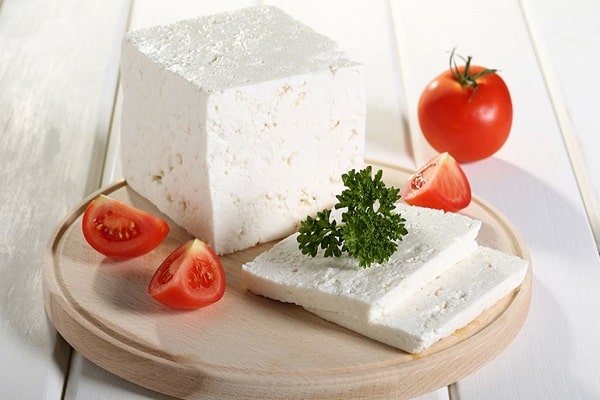Feta Cheese?
This dairy product is actually salted cheese made from sheep’s or goat’s milk, but of Greek origin! This cheese is a constant choice in preparing a wide variety of foods, both Greek and non-Greek.
It is often available in cube molds on the market and due to its crispness, it can be a good seasoning for salads. In the last two decades, it has been decided that only feta cheese, which is traditionally made in certain parts of Greece, should be referred to as feta cheese. The taste of this cheese is salty and spicy, and when used in various foods, it has a dominant and very specific taste.
Because this cheese is made from milk clots and salted, it is rich in various pro biotics and various nutrients. Therefore, if consumed in moderation, it can be considered a healthy product.
If pasteurized milk is used instead of pasteurized sheep and goat milk, the number of pro biotics and nutrients will increase. This type of cheese has a significant amount of saturated fat and sodium, but is still considered one of the healthiest choices.

Nutritional value of feta cheese
When we try to evaluate its nutritional value, we find that this valuable substance is full of various foods. Each ounce of this cheese contains 75 calories along with 4 grams of protein and 6 grams of fat (of which 4 grams is saturated).
It also offers acceptable levels of minerals such as calcium, sodium, folic acid, vitamins B-6, B-12, A and K, along with a range of beneficial probiotics.
Properties of feta cheese
When we try to evaluate its nutritional value, we find that this valuable substance is full of various foods. Each ounce of this cheese contains 75 calories along with 4 grams of protein and 6 grams of fat (of which 4 grams is saturated).
It also offers acceptable levels of minerals such as calcium, sodium, folic acid, vitamins B-6, B-12, A and K, along with a range of beneficial probiotics.
Properties of feta cheese
Cheese is a very popular food in nutrition and health. Cheeses with hundreds of types and models are one of the pillars of preparing a food today. This food retains many nutrients during the production process.
Research published in the American Journal of Clinical Nutrition shows that the longer the cheese, the better the properties for the body. Different types of cheese contain a high percentage of different fats, but apparently have no effect on blood cholesterol.
Nutritionists have come to conclusions about the unique benefits of cheese in treating type 2 diabetes, cardiovascular disease and even cancer. This is the first time that studies show that cheese can have positive effects on health. Improving the immune system, preventing tooth decay, preventing cancer and liver problems can all be treated with cheese.
The remarkable healing properties of this dairy product include preventing cancers, strengthening the immune system, reducing migraines and lowering the risk of anemia, among a myriad of properties. So let’s take a brief look at these properties:
Cancer prevention
According to a series of studies, calcium is found in high amounts in this type of cheese and together with magnesium and vitamin D, it forms a strong anti-cancer compound.
Boosting immunity system
One of the amino acids in this cheese, histidine, is converted to histamine in the body and causes a mild immune reaction. This type of reaction causes the proper functioning of the immune system.
Intestinal health
As mentioned above, feta cheese contains up to 12 types of probiotics that balance the intestinal bacterial population and thus reduce the symptoms of Leaky Gut Syndrome or Irritable Bowel Syndrome.
Reduce the risk of eye disease
Because this valuable substance is rich in riboflavin, it can reduce the risk of cataracts and macular degeneration.
Fighting anemia
Calcium ions are vital for the body to absorb iron, thus preventing anemia. In addition, calcium and other minerals are essential for bone health and prevention of osteoporosis.
Prevention of liver cancer
Proper consumption of cheese will have a great impact on liver health. Older cheeses, such as cheddar cheese, have the potential to increase life expectancy by up to 25 percent.
This is because cheese contains a compound called spermidine that is effective in preventing liver fibrosis and liver cancer. Methionine is an amino acid found in meat and other proteins.
Consumption of cheese causes this amino acid to be lost along with the high amount of calories, and this is one of the reasons for longevity.
Strengthen the immune system
Cheese is very involved in boosting the human immune system. Studies conducted in 2010 showed that eating a piece of cheese daily strengthens the immune system of the elderly in a remarkable way.
Gouda and probiotic cheeses are much more powerful in boosting the immune system than other types of cheese. Probiotic cheeses, which contain some bacteria, are much better at maintaining the immune system.
The secret to a longer life with feta cheese
Cheeses can be used as an elixir of longevity. French people want to live longer and healthier lives than any other people on earth.
This is despite the fact that diet research in this country is different from other countries. Foods with saturated fats are very rare in their lives.
Coronary heart disease is the least common disease in the country, with an average life expectancy of 82 years. In Australia, the rate is many times higher and life expectancy is close to 81 years.
According to research, cheese consumption in France is about 24 kg and in Australia about 12 kg per year. Those who eat a diet high in cheese experience better and more metabolism.
